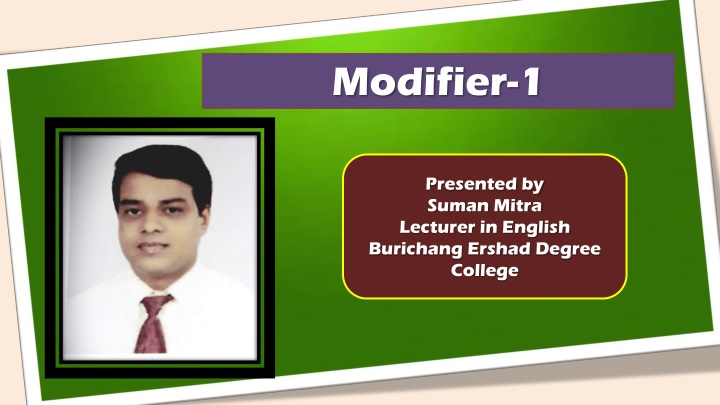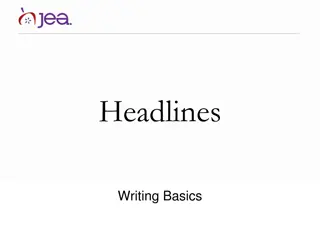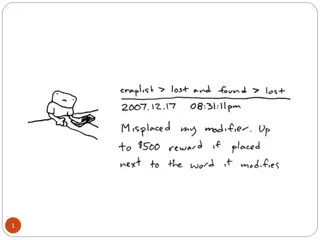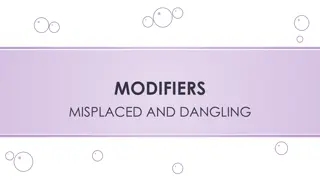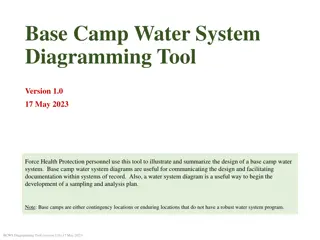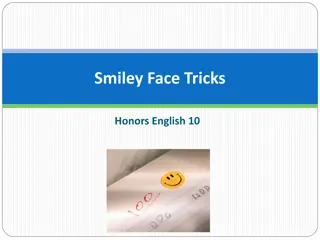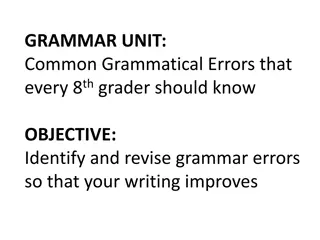Mastering the Art of Modifiers in English Language
Explore the rules and examples of pre-modifiers and post-modifiers in English grammar, including modifying nouns with adjectives, determiners, demonstratives, possessives, quantifiers, articles, verb forms, appositives, present participles, and infinitive phrases. Enhance your understanding of how to effectively use modifiers to enhance your writing skills.
Download Presentation

Please find below an Image/Link to download the presentation.
The content on the website is provided AS IS for your information and personal use only. It may not be sold, licensed, or shared on other websites without obtaining consent from the author.If you encounter any issues during the download, it is possible that the publisher has removed the file from their server.
You are allowed to download the files provided on this website for personal or commercial use, subject to the condition that they are used lawfully. All files are the property of their respective owners.
The content on the website is provided AS IS for your information and personal use only. It may not be sold, licensed, or shared on other websites without obtaining consent from the author.
E N D
Presentation Transcript
Modifier-1 Presented by Suman Mitra Lecturer in English Burichang Ershad Degree College
Rules On Modifiers a word or group of words nouns/ verbs/ adverbs/ modify modifier adjective noun modify adverbs verbs, adjectives or adverbs modify modifiers 1) Pre-modifiers: Bangladesh is a beautiful country. 2) Post-modifiers: He has decorated the room beautifully.
Noun pre-modify Pre-modify the Noun with adjective:Anything sits before noun is generally called Adjective. Noun adjective pre-modify Her husband was a--------farmer. Ans: poor/landless/rich/solvent Pre-modify the Noun with a Determiner: Here should be a word or group of words which will work like an ADJECTIVE. But there are some specific words in this regard.
Pre-modify the Noun using Demonstrative: demonstrative pronoun/demonstrative adjective There are four demonstratives- This/ that/ these/ those. To save _____ boy, he took a lot of risks. I cannot forget______memorable days of my childhood. Ans: that Ans: those Pre-modify the Noun using Possessive: possessive pronoun Adjective Possessive adjectives are- my/ our/ your/ their/ his/ her/its, etc. Without the knowledge of English with proper understanding, you can't complete ______ higher studies. Ans: your Nelson Mandela struggled to save_____countrymen. It has no colour of_______own. Ans: its It is______responsibility to abide by traffic rules. Ans: our Ans: his
Pre-modify the Noun using Quantifier: Quantifiers: a little, a few, much, many, a lot of, some, most, no, any, enough, etc. There are many people in the station. He saw some birds on the tree. Pre-modify the Noun using Articles: Her husband was a farmer. Pre-modify the Noun using a Noun Adjective: Noun Noun Noun modify Adjective It was a cold winter day. Pre-modify the Noun using present participle (verb present form+ing). Do not disturb a sleeping man. I saw a floating ship. Pre-modify the Noun using past participle (verb Past participle ). America is a developed country. He drove the car on the damaged road.
Noun post-modify Post-modify the Noun with an Appositive: / NOUN NOUN / appositive My friend Shami, ________, was driving the car. Ans (probable): a famous singer/ a popular actress/a banker His father,_______supports him cordially. Post-modify the Noun with present participle: (Verb present form+ing) NOUN I saw the bird, ________ in the sky. Ans : flying Post-modify the Noun with infinitive phrase: a group of words (To+verb present form+ extra word) to indicate purpose. My plan __________ was cancelled. Ans: to go abroad Ans : a teacher
Post-modify the Noun with prepositional phrase: a group of words (noun+ preposition+ extra word) The book_______is mine. Ans (probable): on the table Post-modify the Noun with relative clause: Noun relative pronoun I know the man ______ came here. Ans (probable): who Post-modify the Noun using Past participle (verb Past participle (verb+d,ed). Noun verb Past participle The application ________ by me has been granted. Ans (probable): submitted/written
Thank You For Thank You For Watching The Watching The Lesson Lesson
